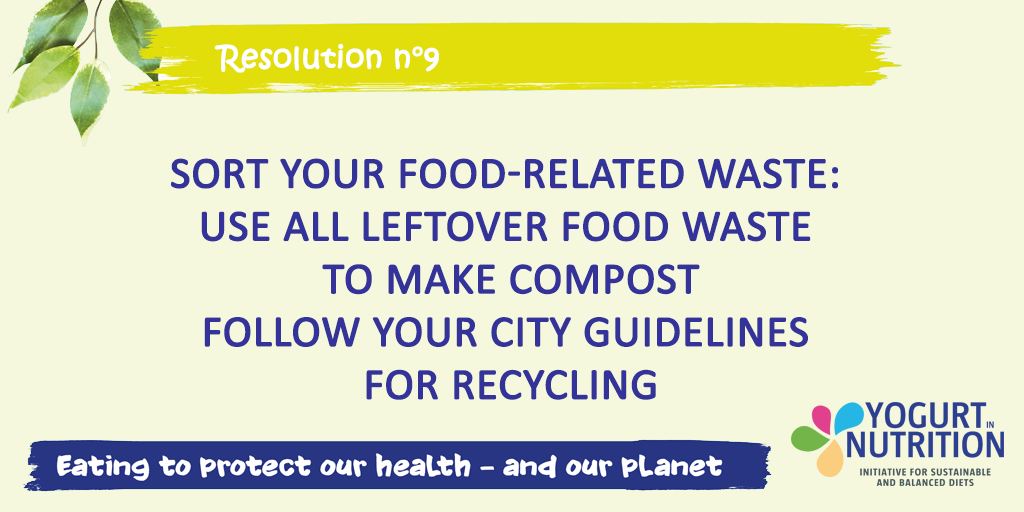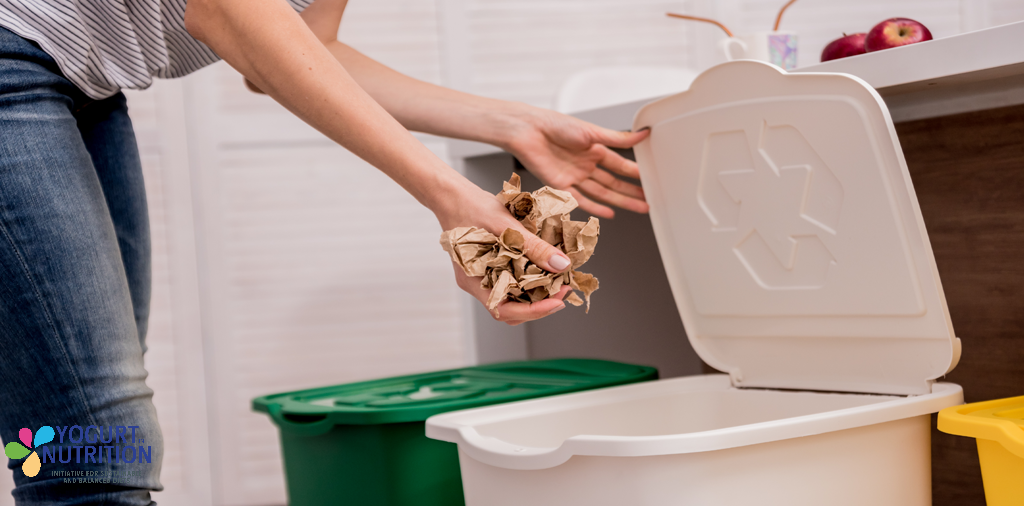At the Yogurt In Nutrition Initiative, we look forward to a more sustainable 2020 and bring you 12 food resolutions to protect our health and our planet! For this month, what about limiting food waste? The food you didn’t manage to save still has value and can be used to feed your compost and you can follow your city guidelines for recycling!

A large part of our food-related waste is thrown in the trash to be incinerated. Many initiatives plan to reduce food loss and packaging waste to save valuable resources and to slow down pollution. The World Resources Institute states that reducing food waste by half would lower greenhouse gas emissions by 1.5 gigatons of carbon dioxide (equivalent per year) by 2050. But there is a part of our waste we can’t suppress. In order to preserve our planet, we need to deal with this amount of waste while having the most ecofriendly behavior. Due to packaging, cooking and meal leftovers, households should integrate new waste management reflexes.
One of these is RECYCLING. It completes the 3-R rules we’ve discussed earlier with REDUCE and REUSE. In fact, recycling is a process of converting waste into new materials. It represents a saving of energy, water, resources (oil) and prevents a certain amount of pollution.
Many things can be recycled: aluminum and steel cans, cardboard, paper, glass, plastics (bags, bottles…) even yard waste (leaves, grass). However, to be ready for a new use, waste has to be in the right bin. So, it is necessary to sort the waste: Don’t mix together paper and glass, or food waste and plastic. Each category has a dedicated bin (glass, paper and cardboard, plastics…). Identify their location and content and follow the recycling instructions attentively, your city guidelines will help you to put the right items in the right bin. But it’s not the case for all:
- Not all the plastics can be recycled!
- When you recycle glass containers, remove the metal cover. You don’t have to clean the jars before disposal them for recycling.
- Don’t confuse cooking glass (transparent ceramic) and real glass. Only the second can be recycled.
- As we’ve discussed in the august resolution, “precycling” seems to be the best recycling behavior. It is when you choose during your shopping only packaging that you can recycle then (glass, cardboard, plastic…). Prefer glass rather than plastic for example.
But packaging isn’t the only waste related to our food consumption. What can you do with your leftovers?
Cooking leaves scraps and leftovers. Stems, peels, unusable bits of food and even the end of your meal… You can compost your edible waste. Coffee, tea, spoiled fruits/vegetables, eggshells, cardboard, tree leaves can also be composted. Install a compost pile or a worm compost system in your garden of your apartment to reduce waste and turn these scraps into nutrient-rich fertilizer. In addition, many municipalities also run composting programs to which you can give your food waste.
With this in mind, recycling has several benefits for individual and environmental health. Everyone can make a contribution and reduce human environmental impact.
For more information, check out our Q&A about sustainable:
- What is a sustainable diet?
- What needs to change in food production to help us achieve a sustainable diet?
Sources:
-
Willett W, Rockström J, Loken B, et al. EAT-Lancet Commission Summary report: Food in the anthropocene: the EAT– Lancet Commission on healthy diets from sustainable food systems. Lancet. 2019;393(10170):447-492.
-
FAO & WHO. Sustainable healthy diets guidelines principles. 2019
-
Jon Johnson. How to reduce food waste. Medical News Today. 2019
-
WWF France. Towards a low carbon, healthy and affordable diet. 2018



